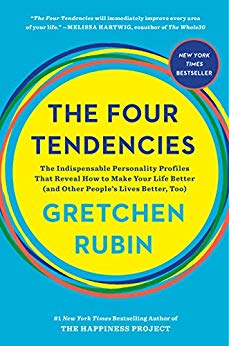

This article is an excerpt from the Shortform summary of "The Four Tendencies" by Gretchen Rubin. Shortform has the world's best summaries of books you should be reading.
Like this article? Sign up for a free trial here .
What is the preferred communication method of each of the four tendencies? How do you determine which of the four tendencies a person belongs to?
In her book The Four Tendencies, Rubin provides some tips on how to effectively communicate with each of the four tendencies (upholder, obliger, questioner, and rebel). She gives advice on things to say that will satisfy all four tendencies and shares questions you can ask someone to determine what tendency they belong to.
Keep reading to learn about Gretchen Rubin’s The Four Tendencies framework and how to communicate with each tendency.
Communicating Effectively With Other Types
The best general rule of thumb is: let others do what works for them. As long as tasks are getting done, people should be allowed to do them however they want to do them.
When trying to persuade someone else to do something, most of us only consider what works for us, not what works for the other person. This only works if someone responds to the exact same things we do. None of the tendencies is shameful or problematic, and none of them is right or better. Whatever works for that tendency is fine. What “should” work for someone else isn’t a useful idea: finding what works for every person should be the goal.
Remember these general rules about Gretchen Rubin’s four tendencies and what they need to do things:
- Upholders just want to know what needs to be done, and they’ll do it. They value self-command and performance.
- Questioners want good reasons for doing what needs to be done. They value purpose and justification.
- Obligers want someone to hold them accountable for what needs to be done. They value teamwork and duty.
- Rebels need freedom and choice to accomplish tasks. They value identity and authenticity.
There’s no one-size-fits-all rule for persuading other people to do something, but the best advice is to use information, consequences, and choice with everyone. Why does this work? It provides what every tendency needs.
Keeping this information in mind is incredibly useful for professionals whose job requires others to cooperate, such as doctors and health professionals, teachers, managers, bosses, and so on.
Example: Tendencies in Practice
One profession who could benefit immensely from using this information is police officers.
Danger can unfold when police officers behave as though civilians should do whatever they tell them however they tell them. Imagine a Questioner being pulled over for reasons unknown to them. The officer walks up to the car and asks the Questioner to step out of the vehicle. The Questioner asks what the offense is. The police officer might take this as a challenge to his authority, when the Questioner is just trying to get all the information.
The situation can escalate from here, with the police officer doubling-down and refusing to give the Questioner answers (even though the Questioner has every right to know what they’re being pulled over for) and the Questioner can become more agitated the more the police officer pressures them with external and opaque expectations.
Public Pleas for Action
One interesting way the information about four tendencies is useful is in the creation of public signage and requests. Often, signs in public are asking us to do something, but they may or may not be asking in the most efficient manner.
Rubin offers an example of bathroom signage written by Obligers, for Obligers: “Treat this bathroom better than your bathroom at home. In an office environment, be respectful! Keep it clean for others, if not for yourself.” This line probably wouldn’t be effective with Rebels, for instance.
She observes that signs “Thank you for not smoking” or “Keep off the lawn” make Rebels, especially, want to break those rules, and leave Questioners dissatisfied with the why of the rule.
Rubin cites the information-consequences-choice rule as a great format for all public signage: it appeals to all the tendencies and will result in the most effective plea for action.
- Upholders will do it because it’s requested; Questioners will do it because you’ve given them the information; Obligers will do it because you asked and the consequences are spelled out; and Rebels will do it because you’ve given them the choice.
- Example of a hotel sign that does this masterfully:: “Reusing towels eliminates the disposal of thousands of gallons of detergent and water each year. If you intend to reuse your towels, please hang them up. If not, please leave them in the bathtub. We appreciate your support of the program, and as always, the choice is yours.”
News programs and government agencies could also use this rule to great effectiveness. For example, if a city wants residents to evacuate for a storm, an evacuation request should address why it’s important to evacuate, cite similar previous storms and why this one is different (to offset the Questioner thought of “if the last big storm didn’t ruin my house, this one probably won’t either”), spell out the consequences if people choose not to evacuate, and then let people make their own decision (instead of ordering people to leave).
Questions for a Quick Evaluation of Tendency
In the appendix, Rubin offers some questions you can use to quickly identify someone’s tendency, whether you’re a boss interviewing for a position, a doctor intaking a new patient, a teacher trying to get to know a student, going on a first date with someone new, or just for fun at cocktail parties.
There are no set answers to these questions, so you’ll have to pay attention to the person’s reasoning when they answer. Listen to the language they use to respond. Remember that tendencies do overlap, and that someone’s tip can make it harder to guess their natural tendency. Remember also that sometimes, people will not be truthful in their answers — this is where paying close attention to their language or reasoning comes into play.
If you took the quiz at the beginning, you’ll also notice these questions are repeats or different versions of some of the questions. The answers given here are general summaries of how the tendencies might answer, not verbatim responses that you should be looking for.
1) How do you feel about New Year’s resolutions?
- Upholders enjoy making resolutions all the time.
- Questioners make and keep resolutions but feel January 1 is an arbitrary date.
- Obligers don’t make resolutions because they always give them up.
- Rebels don’t make resolutions because they don’t believe in them, or they make them if there’s a challenge involved.
2) Imagine there’s a No Cellphones sign where we are, and I pull out my phone and use it. How does that make you feel?
- Upholders feel uncomfortable when someone breaks the rules.
- Questioners wonder if the rule is warranted; if not, break it, if so, follow it.
- Obligers feel uncomfortable because there might be consequences or it might bother other people.
- Rebels enjoy breaking the rules.
3) Would you ever sign up to take a free class? If you did and someone close to you told you it inconvenienced them (in a minor way) for you to take that class, how would you respond?
- Upholders would go to the class, even if it inconvenienced someone else.
- Questioners would spell out their reasons for wanting to take the class and hope the other person understood.
- Obligers probably wouldn’t go due to the external inconvenience.
- Rebels probably wouldn’t sign up for the class in the first place, and they’d go if they felt like it regardless of how someone else felt.
4) Can you remember a time when you changed a major habit?
- Upholders will have many examples.
- Questioners will talk about habits they changed after doing a lot of research about it.
- Obligers will mention habits they changed in conjunction with a partner.
- Rebels will say no, or will say they change habits when they feel like it.
5) Do you find it easy to complete your own to-do list? What about someone else’s?
- Upholders will say yes to both.
- Questioners will do their own easily, but might struggle with someone else’s.
- Obligers will do someone else’s, but not their own.
- Rebels won’t do either, or they’ll have a spin on why or how they do it.
Some surefire questions to identify the tendencies are:
- Do people call you rigid? Upholders will say yes.
- Do people say you ask too many questions? Questioners will say yes.
- Should promises to others be kept, while promises to yourself can be broken? Obligers will say yes.
- Do you think it’s more fun if it’s against the rules? Rebels will say yes.
———End of Preview———

Like what you just read? Read the rest of the world's best summary of Gretchen Rubin's "The Four Tendencies" at Shortform . Learn the book's critical concepts in 20 minutes or less .
Here's what you'll find in our full Four Tendencies summary :
- What the Four Tendencies are, in complete detail
- How to compensate for your tendency's weakness
- Which tendency you pair best with romantically
- How to deal with other people's tendencies






